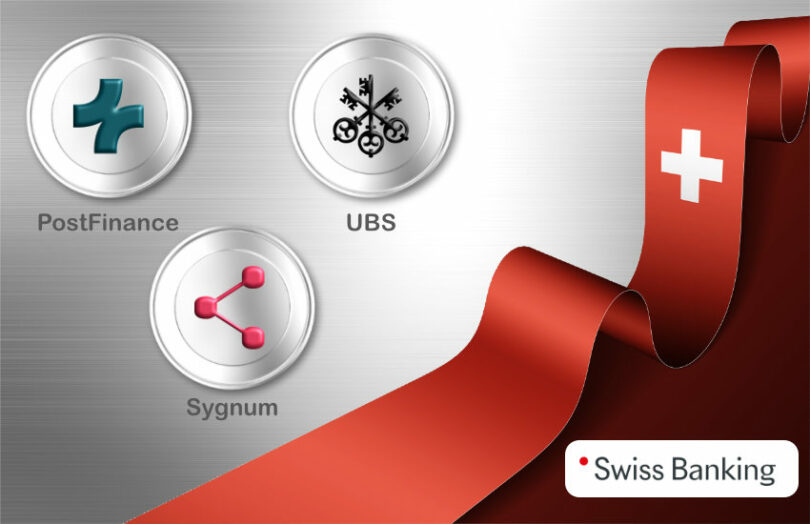UBS, PostFinance and Sygnum signed a memorandum of understanding (MoU) to trial the tokenization of deposits through to late 2025. The Swiss Bankers Association (SBA) says it’s acting as a platform to ensure non-participating institutions are aware of the project’s progress and decisions.
The two initial use cases for the deposit token proof of concept involve basic interbank payments for peer-to-peer payments and an escrow procedure to execute the settlement of financial assets as delivery versus payment. Some of the key benefits of tokenizing bank money include programmability, using it to settle on chain financial transactions (atomic settlement) and the potential for instant settlement 24/7. The latter benefit is also available in many faster payment systems, and Switzerland launched one last month.
The participant banks represent two out of four of Switzerland’s systemically important banks as well as Switzerland’s first digital asset bank Sygnum. The missing two systemic banks are Raiffeisen Group and Zürcher Kantonalbank, although the group is open to other banks joining. However, to move quickly, a small but influential group such as this one is ideal. A project goal is to ensure that banks that join later have a “frictionless and low-threshold entry.”
Last year SBA published a paper on the topic and there were plans for a project which went quiet.
UBS is known as one of the initiators of the Fnality token-based settlement system, which is now backed by twenty global financial institutions. For its part, Sygnum has its own stablecoin DCHF which is used as a settlement token on its tokenization platform Desygnate. It is only available to its own clients that include qualified investors, corporates and institutions. Sygnum powers PostFinance’s retail crypto services to clients.
The Swiss digital currency pedigree
Apart from crypto, Switzerland has been at the forefront of (fiat) digital currencies. The Swiss National Bank is running the wholesale CBDC pilot, which is being used to settle transactions on the SIX Digital Exchange. Prior to that, SIX tokenized money held in a central bank account for settlement. Apart from running the stock exchanges, SIX also operates Switzerland’s core payment system SIC.
“Inaction is not an option”
In March Dr Martin Hess of the Swiss Bankers Association urged the banking sector to take action. He wrote in SIX’s Pay magazine:
“There is also already talk of a tokenized Swiss franc. Such a public good is of central importance for the competitiveness of the Swiss financial sector and its strategic positioning in an increasingly digital economy. Inaction is not an option. The lack of a programmable franc for the general public poses major risks in the global competition between locations. Without it, the digitalization of the economy could progress more slowly and interoperability with digital markets abroad would become a challenge… One possible consequence could be the use of foreign token money.”
A deposit token versus a tokenized deposit
Meanwhile, tokenization terminology often has subtle nuances. For example, the difference between a digital fund and a tokenized fund is the digital one is natively issued on a blockchain. A tokenized fund is a digital twin of pre-existing fund shares.
Most (but not all) of the time, the Swiss agreement refers to deposit tokens, not tokenized deposits. Tokenized deposits represent existing bank deposits that are locked and tokenized, rather than digitally native ones. The term deposit tokens usually implies digitally native and the use of public blockchain. There was also a single mention of a ‘joint issuance’, which may imply a design choice.
However, the SBA clarified via email: “When we say “joint”, we mean that the issuance is a collaborative effort by the banks, adhering to common technical and legal standards, and presented as a public good. The Swiss Bankers Association is overseeing this initiative to ensure consistency. However, “joint” does not imply that a single entity is issuing the tokens. Each bank retains full control over its own liabilities, but the joint approach guarantees that the tokens can always be converted into other forms of money at a 1:1 parity.”
Likewise, we were reading too much into the use of the term ‘deposit tokens’.
“The SBA uses the terms ‘Deposit Token’ and ‘Tokenized Deposits’ interchangeably, although we recognize that some literature differentiates between the two. In our view, either term does not imply the native issuance on a public blockchain. Our primary objective is to use the PoC to gain a deeper understanding of the technical and legal aspects required to define the optimal design for deposit tokens within the Swiss financial market framework conditions.”
Update: SBA clarifications were added.
Ledger Insights Research has published a report on bank-issued stablecoins and tokenized deposits featuring more than 70 projects. Find out more here.






